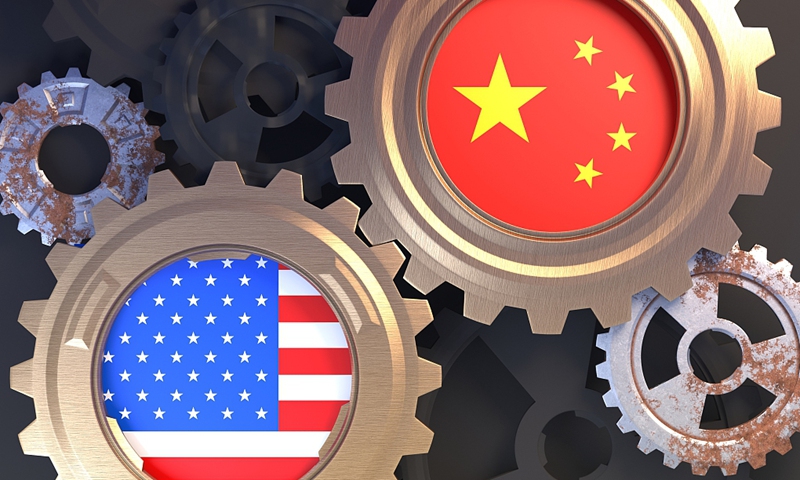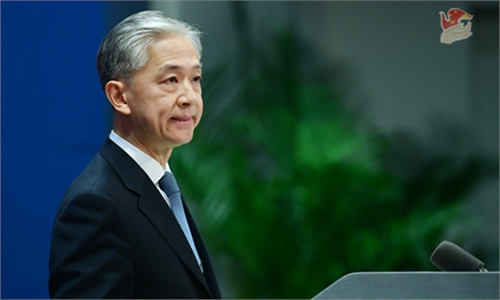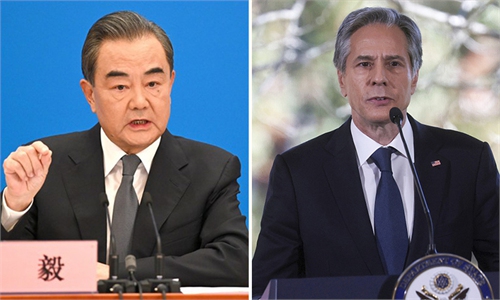Taiwan question to top Xi-Biden meet
Virtual summit likely to guide future ties; won’t completely ease tensions: expert

China-Us
Ahead of the highly anticipated virtual meeting between the top leaders of the world's two largest economies this week, senior Chinese diplomat warned the US to stop manipulating "the Taiwan card" to contain and encircle the Chinese mainland. The warning came after several recent misconducts by Washington politicians, and experts predict the Taiwan question will be a major topic of concern at the meeting.
The meeting is expected to focus on how to define the China-US relationship as it is important for the two major powers to compete on the basis of common rules, Chinese experts said, noting that the two leaders are likely to discuss other issues such as trade, climate change and regional security as well as stability in places like the South China Sea.
The upcoming Xi-Biden meeting via video link, the first such meeting with Xi since Biden took office, will also serve as a clear indication for the future development of the China-US relationship including on which areas the two sides can expand cooperation and on which they need to take disputes under control, some experts said on Sunday.
Taiwan question in focus
Chinese President Xi Jinping will meet with US President Joe Biden via video link on the morning of November 16 (Beijing Time), Chinese Foreign Ministry spokesperson Hua Chunying announced on Saturday. As both sides prepare for the meeting, Chinese State Councilor and Foreign Minister Wang Yi spoke with US Secretary of State Antony Blinken on the phone on Saturday, stressing the importance of "meeting each other half way" and warning the US to not support "Taiwan independence."
On the Taiwan question, Wang expressed in the phone conversation China's opposition to the US' recent wrong words and actions, saying that history and reality have fully proved that "Taiwan independence" is the biggest threat to peace and stability in the Taiwan Straits and any connivance and support for separatists forces is a breach of peace in the Straits and it will eventually bear the consequences of its own actions.
Blinken stressed in a statement issued by the US Department of State following the phone call that the US official emphasized "longstanding US interests in peace and stability" across the Taiwan Straits and "expressed concern" regarding the mainland's continued military, diplomatic and economic pressure against the island.
"I believe the Taiwan question would be the top priority of the upcoming meeting, and we will reaffirm our basic position on the question while sounding a warning to the US, and urging it to act in a restrained way," Xin Qiang, deputy director of the Center for American Studies at Fudan University, told the Global Times on Sunday.
However, the two sides are unlikely to reach any consensus on this question as there is still strong motivation inside the US government to continue playing the Taiwan card, which is seen as one of Washington's most useful leverages against Beijing, Xin said.
A delegation of US Republican lawmakers sneaked onto the island via US military aircraft on Tuesday for the second time since US President Joe Biden took office after a whirlwind visit by three US senators to the island in June. In response to such provocation, the mainland escalated its reaction from dispatching military patrol aircraft to conducting a joint combat readiness patrol last week.
There has been more collusion between US officials and the pro-secession DPP authority lately, including a recent confirmation of US military presence on the island by the island's regional leader Tsai Ing-wen, a move that has clearly stepped on the red line, and a so-called promise from senior US officials like Chairman of US Joint Chiefs of Staff General Mark Milley who claimed the US absolutely has the ability to "defend Taiwan."
"The US has been manipulating the Taiwan question in an attempt to use it as leverage to shadow and control the mainland, but it's bound to shoot itself in the foot," Chinese Ambassador to the US Qin Gang said on Saturday in a virtual message delivered at the 2021 annual meeting of the Alliance for China's Peaceful Reunification in San Francisco.
Considering the Biden administration has not taken any concrete action to correct its wrong words and actions on the Taiwan question, China will continue exerting pressure on the US government, and the latest talk between Wang and Blinken shows that the two sides are still working on this matter, Wu Xinbo, dean of the Institute of International Studies at Fudan University, told the Global Times on Sunday.
"It's hard to say whether China and the US will reach any consensus on this question, but the US has to make some concrete promises in accordance with the one-China principle and in response to China's concerns, otherwise it would affect the outcome of the meeting between the top leaders as well as the future China-US relationship," Wu said.
Xi-Biden meeting will not be able to completely ease China-US relations, and is not even likely to reach a consensus, Jin Canrong, associate dean of the School of International Studies at the Renmin University of China, told the Global Times on Sunday.
There are two elite groups in the US holding different opinions on China policy, including the hard-line faction that advocates playing the Taiwan card, and the other faction, represented by Wall Street elites, who expect to restore economic ties between China and the US, Jin noted. "In fact, this high-level meeting is being held to send a message from the White House to comfort business and financial elites," he said.
A roadmap for future ties
Other major bilateral issues and topics that will guide future ties are expected to be discussed in the Xi-Biden meeting, including cooperation on climate change, opposition to a new cold war, how to manage tariffs and maintaining regional stability in places like the South China Sea, according to experts.
"I think President Xi will reemphasize the new type of relationship between the major powers, insisting on non-confrontation and non-conflicts on the basis of reciprocal and mutual respect, in order to ensure the China-US relationship is on a stable track," Lü Xiang, a research fellow at the Chinese Academy of Social Sciences, told the Global Times on Sunday.
Besides the Taiwan question, the meeting will focus on how to define China-US cooperation and competition, for example, the two countries should compete under commonly recognized rules, Lü noted. "If the US unilaterally sets up some small-sized circles to contain China, it won't work out," he said.
US Secretary of Commerce Gina Raimondo announced her first trip to Asia from Monday to Thursday. She will meet government officials and business leaders in Japan, Singapore and Malaysia, according to a statement on the website of the US Department of Commerce. After a US delegation visited Ecuador, Panama and Colombia in early October, another trip is arranged to Asia before end of the year for the sake of the Build Back Better initiative launched by the G7 in June, media reports said.
On the matter of tariffs, the US has been feeling much more pain from the trade policy of former US president Donald Trump, and the Biden administration appears eager to cancel those tariffs due to the pressure its domestic economy is under, according to experts.
"The Xi-Biden meeting will serve as a clear indication for the future development of the China-US relationship, including in which areas the two countries need to further cooperate and in which they need to take disputes under control, especially on the military and security, and how to improve trade ties by working on the dialogue mechanism," Wu said.



